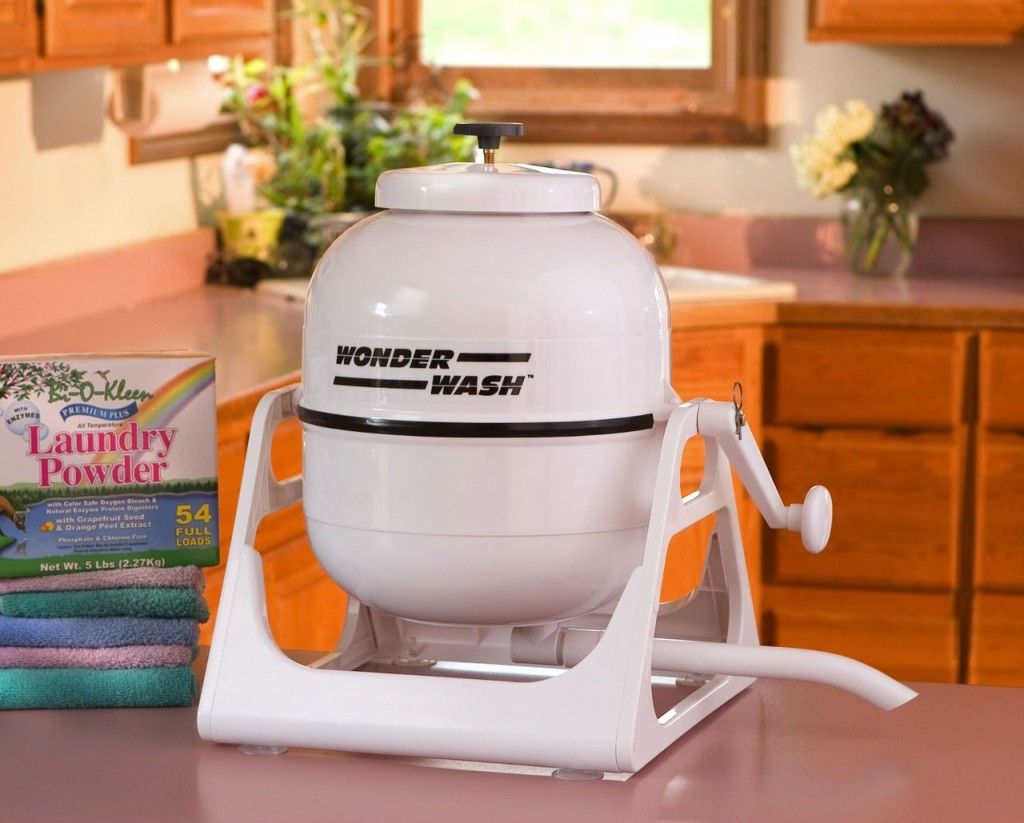Hand-powered washing machines have gained popularity as an eco-friendly, cost-effective, and portable alternative to traditional electric washing machines. These manual devices are designed to clean clothes using physical effort instead of electricity, making them ideal for small loads, travel, or off-grid living. However, while hand-powered washing machines offer numerous advantages, they also come with certain limitations.
This article will explore 15 benefits and inconveniences of using a hand-powered washing machine, helping you decide if it’s the right solution for your laundry needs.
Benefits of Using a Hand-Powered Washing Machine
1. Eco-Friendly
One of the primary benefits of using a hand-powered washing machine is its eco-friendly nature. Since these machines do not require electricity, they help reduce your carbon footprint and energy consumption.
- Zero Energy Use: No electricity is needed, making it ideal for those seeking to live more sustainably or reduce energy bills.
- Water Conservation: Hand-powered machines often use less water than traditional washing machines, further contributing to their eco-friendliness.
2. Portable and Compact
Hand-powered washing machines are typically small, lightweight, and easy to transport. This makes them perfect for people who live in small apartments, dorm rooms, or who travel frequently.
- Perfect for Small Spaces: These machines take up minimal space and can easily be stored in closets, under counters, or in small living spaces.
- Ideal for Travel: Campers, RV travelers, and those on extended trips can benefit from the portability of a hand-powered washing machine.
3. Cost-Effective
Hand-powered washing machines are much cheaper than full-size electric washers, and since they don’t rely on electricity, there are no utility costs associated with their use.
- Low Purchase Price: Most hand-powered machines are affordable, offering a cost-effective solution for those on a budget.
- No Operating Costs: With no electricity or large water bills, you save on monthly utility expenses.
4. Easy to Use
These machines are relatively simple to operate. Most models involve placing clothes, water, and detergent inside the drum, then manually agitating the load by turning a handle or foot pedal.
- User-Friendly: Their straightforward design makes them accessible to almost anyone, with no complicated settings or controls.
- Quick Learning Curve: With minimal instructions, you can quickly understand how to wash clothes manually with these devices.
5. Suitable for Small Loads
Hand-powered washing machines are particularly effective for small loads of laundry, such as washing a few shirts, undergarments, or socks.
- Efficient for Daily Laundry: If you don’t generate a lot of laundry, a hand-powered machine is an ideal solution for quick, small loads.
- Frequent Small Batches: You can wash smaller amounts of clothes regularly, without waiting for a full load, saving water and detergent.
6. Gentle on Clothes
The manual agitation process of hand-powered machines is generally less harsh on fabrics than electric machines, making them a good choice for delicate items like lingerie, wool, or hand-wash-only garments.
- Preserves Fabric Integrity: Hand-powered machines are gentle on clothing, reducing the risk of fabric stretching, shrinking, or damage.
- Ideal for Delicates: Delicate clothes that require careful washing benefit from the soft agitation provided by these machines.
7. Quick Wash Cycles
Because hand-powered machines are designed for small loads, the washing process is usually quick. Most loads can be washed in under 10 minutes, making it convenient for those who need a fast wash.
- Time-Efficient: Shorter washing cycles mean you can quickly clean small amounts of laundry without waiting for a full machine cycle.
- Good for Busy Schedules: For those with limited time, these machines allow for quick, efficient washes.
8. Reduces Wear and Tear on Clothes
Due to the gentle, manual washing process, hand-powered machines help extend the life of your clothes by reducing the wear and tear caused by electric machines.
- Less Fabric Damage: Clothes remain in better condition over time, making them last longer compared to washing in electric machines with strong agitation.
- Softer on Seams and Stitching: Manual agitation puts less stress on seams and stitching, reducing the likelihood of rips or fraying.
9. Off-Grid and Emergency Use
Hand-powered washing machines are ideal for those living off the grid, in areas with frequent power outages, or as a backup solution during emergencies.
- Emergency Preparedness: When electricity is unavailable, hand-powered machines offer a reliable way to clean clothes.
- Off-Grid Living: Ideal for people living in remote areas or off the grid, where access to electricity is limited or unavailable.
10. Reduces Water Consumption
Compared to traditional washing machines, hand-powered models generally require less water, making them more eco-friendly and cost-effective, particularly in areas with water scarcity.
- Water-Efficient: Since you control the amount of water used, you can minimize waste by using only what’s necessary for the load size.
- Good for Drought-Prone Areas: Hand-powered machines are a great option for regions with water restrictions or conservation efforts.
Inconveniences of Using a Hand-Powered Washing Machine
1. Labor-Intensive
One of the most significant drawbacks of hand-powered washing machines is the physical effort required to operate them. Users must manually agitate the clothes by turning a handle or using a foot pedal, which can be tiring.
- Physical Effort Required: Washing clothes manually can be more physically demanding than using an electric washing machine, especially for larger loads.
- Time-Consuming for Large Loads: Washing multiple loads can be time-consuming and physically taxing, as each load requires manual effort.
2. Limited Capacity
Hand-powered washing machines are designed for small loads, typically holding only a few items at a time. This makes them less practical for households with large laundry needs.
- Not Suitable for Large Families: Households that produce a lot of laundry may find hand-powered machines inefficient due to their limited capacity.
- Multiple Loads Required: To wash a larger amount of laundry, multiple small loads are necessary, which can be time-consuming.
3. Limited Stain-Removal Power
While hand-powered machines are effective for lightly soiled clothes, they may struggle to remove tough stains, such as grease, mud, or grass, compared to electric machines.
- Not Ideal for Heavy Soiling: For clothes with significant stains or dirt, hand-powered machines may require pre-treatment or additional scrubbing.
- Requires Pre-Treatment: Tough stains often need pre-treatment with stain removers before washing, adding extra time and effort to the process.
4. No Automatic Spin Cycle
Most hand-powered washing machines do not have a spin cycle, meaning clothes will need to be wrung out manually or air-dried without the benefit of a spin dryer.
- Manual Drying Needed: Without an automatic spin cycle, you’ll need to manually wring out excess water, which can be time-consuming and less effective.
- Longer Drying Times: Clothes may take longer to dry since they’re not spun to remove excess water like in electric machines.
5. Noisy Operation
Some hand-powered washing machines can be noisy during operation, especially models with hand cranks or foot pedals. This may be bothersome in small spaces or during quiet times.
- Can Be Noisy: Turning the crank or using the foot pedal can produce noise, which might not be ideal for apartment living or when others are around.
6. Limited Features and Adjustability
Unlike electric washing machines, hand-powered models offer limited features, such as adjustable settings for water temperature, spin speed, or wash cycles. This lack of customization can be an inconvenience for users who prefer more control over their laundry process.
- No Temperature Control: Most hand-powered machines do not offer temperature adjustments, limiting your ability to use hot water for deeper cleaning.
- Basic Functionality: Hand-powered machines lack many of the advanced features of modern electric washers, such as delayed start, automatic detergent dispensing, or specific wash programs.
7. Inconsistent Cleaning Results
Because hand-powered machines rely on manual agitation, the cleaning results may vary based on the user’s effort and the machine’s design. Inconsistent agitation can lead to less effective cleaning.
- Effort-Dependent: The cleanliness of the clothes largely depends on how much effort is put into manually agitating the load.
- May Miss Spots: Inconsistent agitation can result in areas of clothing being less thoroughly cleaned.
8. Time-Consuming for Larger Loads
While hand-powered washing machines are effective for small loads, washing larger amounts of laundry can become time-consuming due to the need for multiple loads and manual operation.
- Longer Laundry Sessions: Washing several loads of laundry by hand takes significantly more time than running a full load in an electric washer.
- Frequent Handling: Each load requires hands-on attention, making it a more involved process than simply loading and unloading an electric machine.
9. Less Effective Rinsing
Since hand-powered machines rely on manual water circulation, they may not rinse clothes as thoroughly as electric machines with multiple rinse cycles. This could lead to detergent residue remaining on clothes.
- Rinsing Requires Extra Steps: You may need to manually rinse clothes multiple times to ensure all soap is removed, which can be inconvenient.
- Risk of Residue: Incomplete rinsing can leave detergent or soap residue on clothes, which can irritate sensitive skin.
10. Potential for Wear
and Tear on Machine
Hand-powered washing machines may wear out more quickly due to the manual mechanisms involved in their operation. The hand crank or foot pedal can become loose or difficult to operate with extended use.
- Durability Issues: Repeated use may cause mechanical parts like cranks or pedals to degrade over time, requiring repairs or replacements.
- Shorter Lifespan: Depending on the quality of the machine, it may not last as long as an electric washer with a more robust motor and components.
Conclusion
Hand-powered washing machines offer an eco-friendly, portable, and cost-effective alternative to traditional electric washers, making them ideal for small loads, off-grid living, and budget-conscious households. However, they come with certain inconveniences, such as limited capacity, physical effort, and inconsistent cleaning power. If you’re looking for a sustainable way to wash smaller amounts of laundry and don’t mind the extra effort, a hand-powered washing machine can be a great addition to your home. However, for larger families or those with heavy-duty laundry needs, the limitations of these machines may outweigh the benefits.




